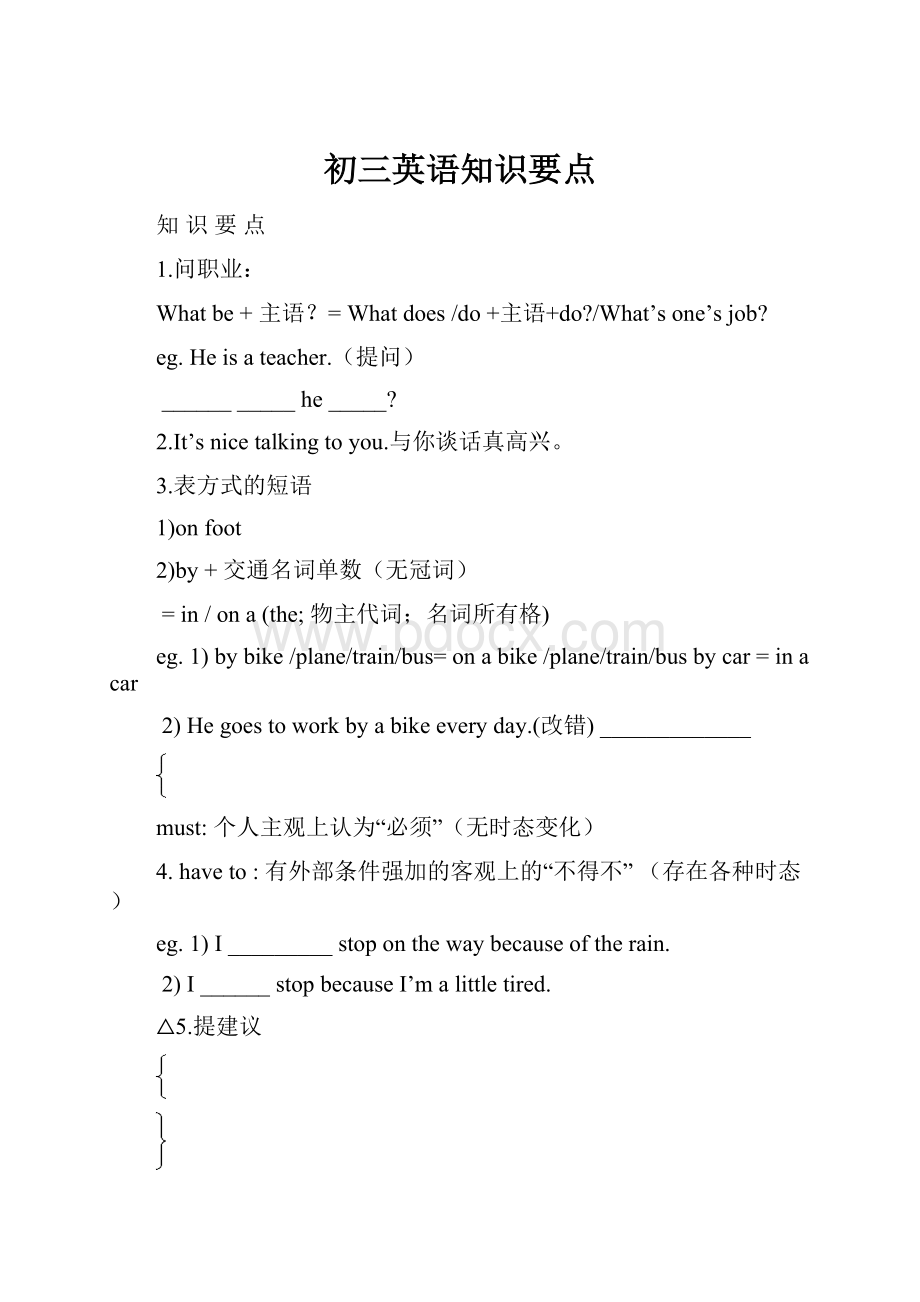初三英语知识要点.docx
《初三英语知识要点.docx》由会员分享,可在线阅读,更多相关《初三英语知识要点.docx(20页珍藏版)》请在冰豆网上搜索。

初三英语知识要点
知识要点
1.问职业:
Whatbe+主语?
=Whatdoes/do+主语+do?
/What’sone’sjob?
eg.Heisateacher.(提问)
___________he_____?
2.It’snicetalkingtoyou.与你谈话真高兴。
3.表方式的短语
1)onfoot
2)by+交通名词单数(无冠词)
=in/ona(the;物主代词;名词所有格)
eg.1)bybike/plane/train/bus=onabike/plane/train/busbycar=inacar
2)Hegoestoworkbyabikeeveryday.(改错)_____________
must:
个人主观上认为“必须”(无时态变化)
4.haveto:
有外部条件强加的客观上的“不得不”(存在各种时态)
eg.1)I_________stoponthewaybecauseoftherain.
2)I______stopbecauseI’malittletired.
△5.提建议
Shallwe…?
答肯定:
Goodidea/OK/
Let’s…Allright
Whynot…?
语否定:
No,let’s…
肯定:
Certainly/Yes,please/
另外还可回答为Yes,Ithinkso/I’dloveto
否定:
No,Idon’tthinkso/
I’mafraidnot.
puton强调“穿”的动作:
穿上,戴上后接
△6..wear是puton之后的结果:
穿着“衣服”
=bein名词
dresssb/oneself/color:
给某人穿衣
eg.1)You’dbetter____moreclotheswhenyougoout.It’scoldoutside.
A.wearB.dressC.putonD.takeoff
2)Theboycan________himselfnow.
A.wearB.dressC.putonD.takeoff
3)Tomiswearingaredshirttoday.
A.isonB.isinC.isputtingon
△7.在具体的某楼前用on
eg.Helivesonthefifteenthfloor.
△8.Howdoyoulike…?
你觉得……怎么样?
=Whatdoyouthinkof…?
eg.Howdoyou_______thenewfilm?
=Whatdoyou_________thenewfilm?
你觉得这部新电影怎么样?
9.alittle=abit但注意:
1)alittle+名词=abitof+名词)
eg.Thereisalittle(abitof)waterintheglass2)notalittle=venotabit=notatall
△
10.quite:
quitea(an)+形+名
very:
avery+形+名
eg.Thisisaveryinterestingbook.
=Thisisquiteaninterestingbook.
11.inahurry:
匆忙地/hurryup
eg.1)Heisinahurryallday.
2)Shewenttoschoolinahurry.
另外:
hurryto…=goto…inahurry
12.marrysb=bemarriedtosb.与某人结婚
getmarried=bemarried已婚;结婚
(但getmarried是“短命”动词,要指“结婚多久”应用bemarried)
eg.1)Shemarriedwithadoctor(找错)______
2)Shehasgotmarriedfortenyears(找错)__________
△
13.leavesth+地点:
把某物忘在某地
forgetsth:
忘记某事
eg.1)He______thedriver’slicenseyesterday.
2)I____myumbrellainthetrainjustnow.
△14.感叹句
1)What(a,an)+形+名(+主+谓)!
(注:
但名词为不可数、复数时,则不用a/an)
2)How+形/副(+主+谓)!
eg.1)________badweather!
2)______hardtheyareworking!
3)______goodgirlsheis!
4)_____beautifulflowerstheyare!
“雨大,雪大”heavy---heavily/hard
△15.“风大”strong---strongly
“太阳大”bright---brightly
注意以上词的形、副区别
eg.1)Therewasa__________rainyesterday.2)Itblew________lastnight.
3)Thesunisshining___________.4)Look!
It’sraining__________.
5)Whata___________wind!
howlong:
多长时间(问时间段)
△16.howoften:
多久一次(问频率)
howsoon=when:
何时(in+短时间)
howfar距离多长
eg.1)--________doeshegohome?
--Onceaweek.
2)--________wereyouawayfromschoollastyear?
--Lessthanaweek.
3)--________willhecomeback?
--Intwodays.
taketheplaceof动词词组(谓语)
eg.1)Ididn’tgotothecinema._____Iwenttothelibraryyesterday.
2)Wewouldliketostayatschool_______goingtothecinematoday.
△18.so句型
so+be(助、情)+主语:
“也如此”
so+主语+be(助、情):
“的确如此”
eg.1)IwatchedTVlastnight,andsodidshe.昨晚我看了电视,她也看了。
2)IwatchTVeveryday,andsodoeshe.我每天看电视,他也如此。
3)Icanswim,soIcan.我会游泳,真的是这样。
注意:
表示“也不如此”用neither/nor
eg.Ididn’twatchTVlastnight,neitherdidshe
△19.指路与问路
问路
1)Excuseme.Couldyoutellme…
howIcangetto….
howtogetto…
thewayto…
2)Excuseme.Whichisthewayto…
指路
1)Godown/up/alongthisroadand…
go还可替换为walk2)Godown/up/alongtotheend.
3)Goonuntilyoureachtheend.4)Takethe…turningontheleft.
=Turnleftatthe…turning.
5)Goacrossthebridge
△20.
eg.1)He’ssick/illinhospital.
2)Anurse(A)musttake(B)good(C)careofill(D)men.(选错)_____________
△21.
eg.1)__________heisastudent.2)He___________astudent.
△22.
类似结构
△23.到达
但当后不接地点时,只能用arrive
eg.1)She____Shanghailastnight.
A.reachedtoB.gotC.arrivedinD.arrivedat
2)They____thereintimeatlast.
A.reachedtoB.arrivedC.gottoD.arrivedat
1)I’llringyouupassoonashe_____(到达).
eg.1)Sheis_____________girl.
2)Doyoufeel______whenyouare_____?
3)Theoldmanliveinahouse________.
eg.Ihave(A)many(B)worktodo(C)______
△
toomany+可数名词
eg.1)Hegaveus_________money.
2)Sheis___________young.
△
eg.1)Please____yourexercisebookheretomorrow.
2)Meimeioftenhelpstheoldman_____water.
eg.–-Ilookedformypen___________,butIcouldn’tfindit____________.
---Don’tworry.Soonerorlateryou’llfindit_________.
30.toone’ssurprise使某人吃惊的是……
类似结构:
toone’sjoy使某人高兴的是……
eg.Toourgreatsurprise,shecouldswimintheriver.使我们惊奇的是,他能在河里游泳。
31.agreewith:
同意某人(或某人所说的)
agreeto:
同意某事
eg.1)Heagree___myplan.
2)Iagree____whatyousaid.
32.beon…team:
参加……队;是……的队员
eg.Heisonthecitybasketballteam.
他是市篮球队队员。
△33.teachsb+科目(当sb是人称代词时应用宾格)
eg.HeteachesourEnglish(改错)__________
△34.the100-metrerace100米赛跑
100-metre作定语,修饰race,注意metre用单数。
类似结构:
①atwo-thousand-wordletter一封两千字的信
②an18-year-oldgirl一位18岁的女孩
另外有时还可用所有格形式来表达:
100-metrerace=100metres’race
two-monthholiday=twomonths’holiday
但当前面有a/an;物主代词;所有格时。
则只能用复合形容词来表示:
eg.WhatdidtheheadmastersayaboutJim’s______.
A.twomonthsholidayB.Twomonths’holiday
C.two-monthholidayD.twomoth’sholiday
35.problem与question
question:
指人们主观上产生而提出等待回答的问题。
常与ask,answer连用
problem:
指客观上存在等待解决的问题着重指“难题”。
常与solve,workout连用
1)Wemustfindoutagoodwaytosolvethe______.
2)Youcananswerthe_____inyourownwords.
borrow:
借进borrow…from从…借
△36.lend:
借出lendsbsth=lendsthtosb
把某物借给某人
keep:
保存;借(多久)(与时间段连用)
1)Jack____mehisbikelastweek.
2)Youcan_____thebookfromme,butyoucan____itforonlyoneweek.
△37.It’s+adj+of/forsbtodosth.
当形容词用于修饰人时,介词用of.常见的此类形容词有:
kind;good;clever;careful;polite;right;wrong.其余情况用It’s+adj.+for.sb.+todosth
1)It’sveryclever____youtodothat.
2)It’shard____metoworkouttheproblem.
△
38.more:
另外的;额外的(放在数量词之后)other+数量词剩余的。
。
。
。
。
another:
再一(另一…)(放在数量词之前)
1)MayIhavetwo_____apples?
2)MayIborrow_______onebook?
usedto+动原:
过去常常做…
△39.beusedto+动原:
被用于做…
be/getusedtosth:
习惯于某事
1)Heusedtobelateforschool.2)Theknifeisusedtocutthings.
3)Heisuesdtohardwork.
other:
放在被修饰词之前1)otherstudents别的学生
△40.else:
放在被修饰词之后,一般修饰不定代词和疑问词2)anybodyelse.其它任何人
whatelse.别的什么
△41.so+形/副
such+形+名
但注意:
1)so+形+a/an+单名=sucha/an+形+单名
2)so(many/much/few/little)+名
3)so…that;such…that如此…以致…
①Itwas____badweather.
②Thereare____manypoorinthecountry.
③____fewanimalseat____muchgrass.
④Thiscityis____old,you’dbettervisitit.
⑤It’s______importantparty____Ican’tmissit.
have/hasbeento:
曾经去过…
△42.have/hasgoneto:
已经去了…
have/hasbeenin:
已在…(多久)
注意:
1)后接地点副词here,there,home时应省介词
2)与时间段连用只用have/hasbeenin
①--Where’sTom?
--He______________Beijing.
②I______Beijingseveraltimes.
③She________Chengdufortwoyears.
④He__________theretwice.
△43.“短命”动词“长命”动词
buy—have;borrow—keep;die—bedead;leave—beaway(from);comeback—beback;fallasleep—beasleep;open—beopen;
catchacold—haveacold;go/getout—beout;
arrive(reach/getto/cometo)+地点—bein+地点;join—bein+集体(或be+成员);
turnon—beon;turnoff—beoff;
getaletterfrom—havealetterfrom.
end/finish—beover;getup—beup;
1)Hehas(A)bought(B)thefridge(C)for(D)twoyears._________
2)Howlong(A)may(B)Iborrow(C)the(D)book?
_________
3)Thefilm(A)hasbegun(B)forfiveminutes(C)._________
4)Tomhasgot(A)theletter(B)from(C)Jimfortwodays(D).__________
5)Ihave(A)caught(B)acoldsincetwoyearsago(C).____________
6)Hehas(A)cometo(B)Beijingfortenyears(C)___________
7)Mybrother(A)hasjoined(B)thearmy(C)for(D)fiveyears.___________
44.except:
除…以外(不包括除去的部分)
besides:
除了…,还有…(包括除去的部分)
nothing/nobodybut
1)WegotoschooleverydayexceptSunday.
该句意味着:
WegotoschoolfromMondaytoSaturday.
2)WeallwenttotheparkbesidesLiLei.
该句意味着:
Wewenttothepark,andLiLeiwent,too.
take:
Ittakesbsometimetodosth.
△45.
主语
pay(money)forsth是人
buysthfor+money
cost:
sthcostsb+money主语是物
1)I_____tenyuanonthebook.2)I_____tenyuanforthebook.
3)Thebook_____metenyuan.4)I_____thebookfortenyuan.
5)It_____meanhourtodothemathsproblem
sometime:
某时(与将来时连用)
△46sometimes:
有时(一般现在时)
sometime:
一些时候(表时间段)
sometimes:
几次
eg.1)He_______(go)toBeijingsometimenextweek.
2)I_______(be)toBeijingsometimes.
47.MustI…..?
No,Youneedn’t/don’thaveto.MayI…..?
No,Youmustn’t/can’t.
△48.计量:
表事物的“长、宽、高、深、远、厚”用“long;wide;high/tall;deep;away;thick.
1)MrGreenisnearlytwometres________
2)Theiceisaboutonemetre_________.
3)Ourclassroomisabouttwelvemetres______andeightmetres__________.
△49.population:
不可数名词指人口的多少用“large/big或small”;询问人口的多少用what.
1)What’sthepopulationofGermany?
德国的人口是多少?
2)Chinahasalargepopulation.中国人口众多
3)Thepopulation(A)of(B)Japanisless(C)thanthat(D)ofIndia.____________
另外注意:
表示“有…人口”用haveapopulationof.
NowChinahasapopulationofmorethanonebillion.现在中国有十亿多人口。
eg.makeroomfor:
为…腾出空间
51.seem的用法:
1)seem+adj=seemtobe+adjHeseemsveryangry=Heseemstobeangry.
2)seemtodoItseemstoraintomorrow.明天似乎要下雨。
3)Itseems+that从句Itseemsthatyouareright.你似乎是对的。
1)We____them5to3.
2)Intheendwe_____thematch.
interested;excited;surprised/pleased主语是人。
指某
△53.人对…感兴趣/感到兴奋/感到惊奇(只作表语)
interesting;excited;surprising/pleasant主语是物。
指某物有趣/令人兴奋/使人惊奇(可作定、表语)
1)It’san